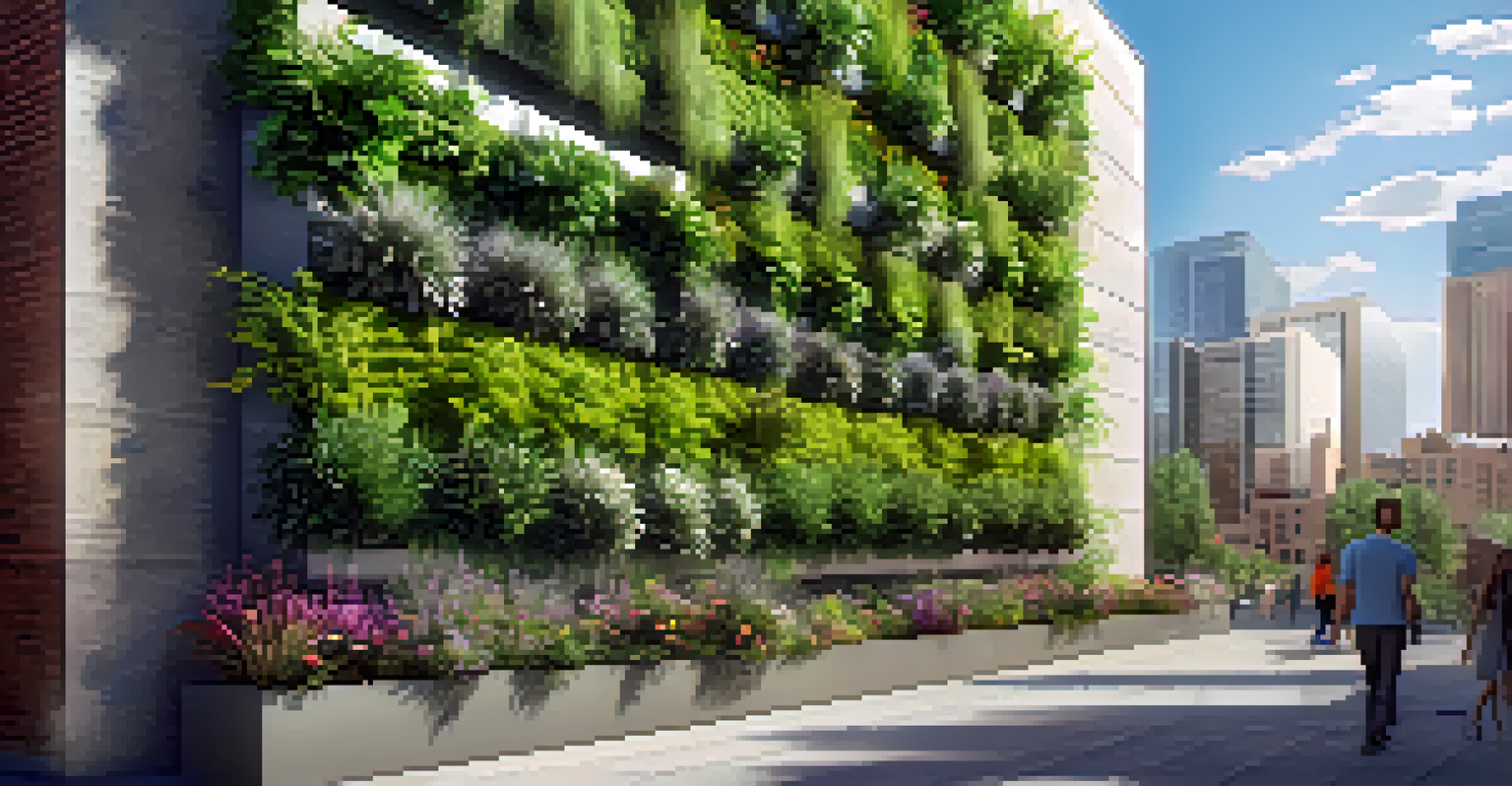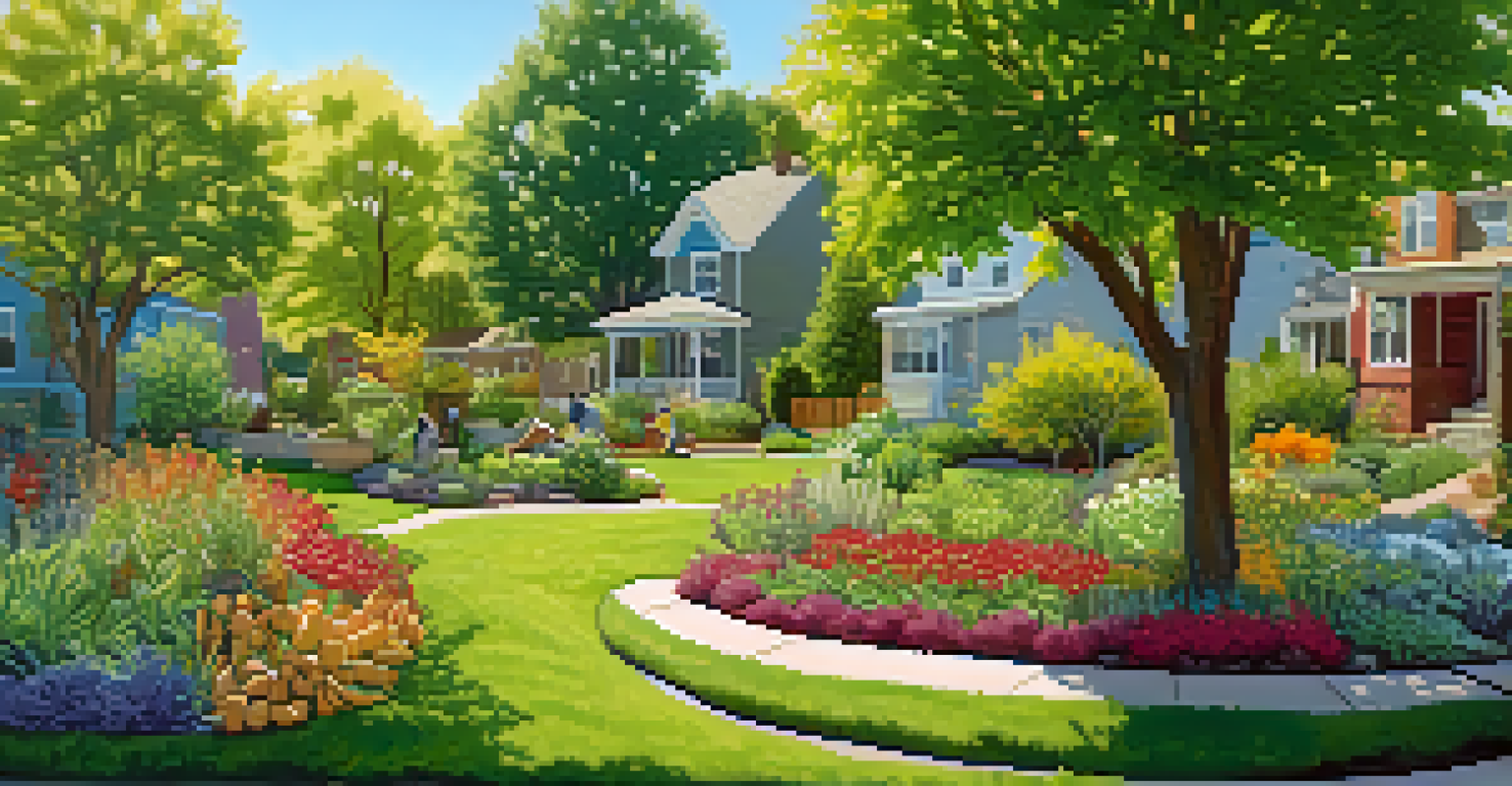Urban Gardening: Transforming Denver's City Landscapes

The Rise of Urban Gardening in Denver
Urban gardening is more than just a trend; it's a movement that's gaining momentum in Denver. With the city’s increasing interest in sustainability and local food production, residents are taking to backyards, balconies, and even rooftops to cultivate their own green spaces. This shift not only beautifies the urban landscape but also promotes a sense of community.
The best way to predict the future is to create it.
As people become more aware of their environmental impact, urban gardening offers a practical solution. For instance, growing your own herbs or vegetables reduces the carbon footprint associated with transporting produce. Moreover, it empowers individuals to take control of their food sources, fostering a deeper connection to what they eat.
In a city like Denver, where outdoor activities are part of the lifestyle, urban gardening fits right in. The initiative encourages a healthy lifestyle while providing an enjoyable way to engage with nature amidst the hustle and bustle of city life.
Community Gardens: Cultivating Togetherness
Community gardens are a cornerstone of urban gardening in Denver, uniting neighbors in a shared mission. These gardens, often located in vacant lots or parks, allow residents to collaborate, share resources, and enjoy the fruits of their labor together. This communal approach fosters relationships and builds a sense of belonging.

Take, for example, the Denver Urban Gardens initiative, which has established over 100 community gardens across the city. These spaces not only provide fresh produce but also offer educational programs, teaching participants about sustainable gardening practices. This hands-on learning experience has a lasting impact on both individual gardeners and the community as a whole.
Urban Gardening Promotes Sustainability
Denver residents are increasingly engaging in urban gardening to enhance local food production and reduce their carbon footprint.
Community gardens also address food insecurity, providing access to fresh fruits and vegetables in urban areas where they might otherwise be scarce. By growing food collectively, neighbors can support each other and contribute to a healthier local ecosystem.
Vertical Gardens: Maximizing Space in the City
With space at a premium in urban environments, vertical gardens are a clever solution for Denver residents. By utilizing walls, fences, and other vertical surfaces, gardeners can grow a variety of plants without needing a traditional garden plot. This innovative approach allows for creative landscaping while making the most of limited space.
Gardening is how I relax. It's another form of creating and playing with colors.
For instance, many Denverites are using vertical gardening systems to cultivate herbs, flowers, and even small fruits. These gardens not only save space but also add aesthetic appeal to homes and businesses. Imagine walking down a street lined with lush, green walls—it transforms the urban atmosphere into something vibrant and inviting.
Moreover, vertical gardens can improve air quality and reduce noise pollution, making them beneficial for the environment as well. As more people embrace this gardening style, we can expect to see an increase in these green installations throughout the city.
Edible Landscapes: Food in Unexpected Places
Imagine strolling through a Denver neighborhood and spotting edible plants growing alongside ornamental flowers. This is the essence of edible landscaping, which integrates food-producing plants into traditional landscaping designs. It’s a creative way to beautify spaces while providing fresh produce for the community.
Denver’s commitment to sustainability has encouraged many homeowners and businesses to adopt this approach. By planting fruit-bearing trees, berry bushes, and herb gardens in public spaces, residents can turn their city into a food-producing oasis. This not only enhances the aesthetics of the area but also promotes a local food culture.
Community Gardens Foster Connection
Community gardens in Denver not only provide fresh produce but also build relationships and support networks among neighbors.
Edible landscapes can also educate the public about the benefits of growing food in urban settings. They serve as a reminder that food doesn’t just come from the grocery store; it can be part of everyday life, right outside your door.
The Role of Technology in Urban Gardening
In today’s digital age, technology is playing a significant role in the evolution of urban gardening in Denver. From smart irrigation systems that conserve water to apps that connect gardeners with each other and local resources, tech is making it easier for city dwellers to grow their own food. This integration helps streamline the gardening process and encourages more people to get involved.
For instance, many urban gardeners are using sensors to monitor soil moisture and nutrient levels, ensuring optimal growing conditions. This not only maximizes yield but also minimizes waste, making gardening more efficient and sustainable. It’s amazing how technology can transform a traditionally hands-on activity into a more data-driven practice.
Additionally, social media platforms are fostering a sense of community among urban gardeners. Sharing tips, successes, and challenges online helps create a supportive network, inspiring others to join the movement and share their experiences.
Health Benefits of Urban Gardening
Urban gardening offers numerous health benefits that extend beyond just physical fitness. Engaging in gardening activities can reduce stress, promote mental well-being, and encourage a healthier diet. Spending time in nature has been shown to improve mood and overall mental health, making it a perfect antidote to the stresses of urban living.
Moreover, growing your own food encourages healthier eating habits. When people have easy access to fresh vegetables and fruits, they are more likely to incorporate them into their diets. This shift toward homegrown produce can lead to better nutrition and overall health.
Technology Enhances Gardening Efforts
Innovative tech solutions are streamlining urban gardening in Denver, making it easier for people to grow their own food.
Additionally, gardening provides physical exercise, from digging and planting to watering and harvesting. It’s a fun way to stay active while enjoying the outdoors, making it a win-win for both body and mind.
The Future of Urban Gardening in Denver
As more residents embrace urban gardening, the future looks bright for Denver's green spaces. Local government initiatives and community organizations are increasingly supporting these efforts, recognizing the value they bring to the city. This support can lead to more resources, workshops, and public spaces dedicated to gardening.
Moreover, as climate change continues to impact urban environments, urban gardening may play a crucial role in resilience strategies. By increasing green spaces, cities like Denver can combat heat island effects, improve air quality, and promote biodiversity. The integration of more gardens into the urban fabric is essential for sustainable city living.

Ultimately, urban gardening in Denver is about more than just growing food; it’s about cultivating community, enhancing mental well-being, and creating a more sustainable and beautiful city. As this movement continues to expand, we can expect to see Denver transform into a greener, more connected place for all its residents.